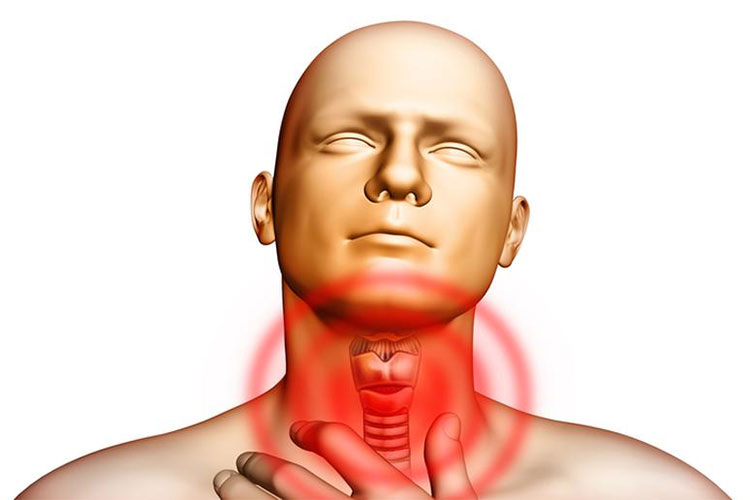Hyperthyroidism and cardiovascular complications
22/07/2019
Hyperthyroidism is a condition in which the thyroid gland produces too much hormone. Signs of hyperthyroidism are quite typical, which is sudden weight loss, fast or irregular heartbeat, sweating, and nervousness or irritability. However, because the progression of these symptoms increases gradually, many cases are difficult to recognize, leading to many complications, of which the most dangerous is cardiovascular complications.
How to recognize the symptoms of hyperthyroidism?
The disease is more common in women than men, very rarely in children under 10 years of age. Symptoms include: The goiter is then often large, diffuse in both lobes, sometimes larger in one lobe than the other, may have one or more nodules. Heat regulation disorder: the patient is afraid of heat, hot and humid skin and low fever, wet hands and thirst, drinking a lot, urinating a lot. When infected, patients lose weight rapidly, although they still eat normally, sometimes eat more, but sometimes gain weight paradoxically in some young people.

Patients (patients) may have muscle atrophy, muscle weakness, squatting and not being able to stand up on their own. There may be bipedal periodic pseudoparalysis. In addition, there may be diarrhea several times a day, without abdominal cramps. Restlessness, anxiety, mood swings, irritability. Psychiatric disorders can occur but are rare. Tremor in fingers, vasomotor disorders: blushing from time to time, sweating. The heart beats fast, usually more than 100 beats/minute. Thrilled palpitations. Heart rhythm disturbances. Heart failure.
Expression in the eyes, usually in 2 eyes and glare, tearing, burning eyes, feeling like dust flying into the eyes. Bright, sparkling eyes. Eye protrusion, periorbital edema, conjunctival edema. Paralysis of oculomotor muscles causes double vision, eyes cannot look up and sideways.
Cardiovascular complications

- Hypertension: Hyperthyroid patients often have hypertension, mainly systolic blood pressure while diastolic blood pressure is still normal, blood pressure gap is increased. Although high blood pressure is small and rarely requires treatment, if it persists, it can also affect how the heart works, contributing to heart failure.
- Heart failure syndrome: Increased thyroid hormone causes the heart to contract strongly and quickly, this activity requires healthy and nourished heart muscle cells to provide enough oxygen. If this condition persists, or when myocardial reserve is not sufficient for the heart to meet the increased cardiac output demands that occur in hyperthyroidism, then heart failure, initially left-sided heart failure, is usually followed by heart failure. whole heart. Heart failure due to hyperthyroidism is different from most cases of heart failure in that the amount of blood pumped out by the heart is higher than normal (called hyper-output heart failure), but this difference is only in the stage of heart failure. In the early stages, if prolonged, the cardiac output eventually decreases, and the clinical presentation of late-stage heart failure in hyperthyroidism is not different from heart failure due to other causes such as dyspnea, edema, hepatomegaly, and diabetes. little, purple lips…
- Coronary failure syndrome: The heart beats fast and strong for a long time, causing the myocardial cells to enlarge, especially the left ventricle, then the myocardial oxygen demand will increase. However, because blood enters the coronary arteries during diastole, when the tachycardia due to hyperthyroidism shortens the diastolic time, the coronary blood flow is reduced, resulting in myocardial ischemia. However, chest pain in patients with hyperthyroidism very rarely turns into myocardial infarction, and when the hyperthyroidism is cured, the chest pain disappears.
- Cardiac Arrhythmias: Tachycardia is considered the most faithful sign of hyperthyroidism but in most cases the heart rhythm remains regular (called sinus tachycardia). Approximately 10-15% of patients with hyperthyroidism have arrhythmia complications, the most common being atrial fibrillation. At that time, the patients often had palpitations, a lot of palpitations, some had chest pain, even some patients fainted. When there is an arrhythmia, the heart squeezes strongly and sometimes weakly, as a result, the blood in the heart chambers is not fully ejected, which will gradually form a blood clot, causing a stroke.
Can hyperthyroidism be treated?
Treatment of hyperthyroidism is usually satisfactory, but there are cases of recurrence. The choice of treatment method depends on the specific case, depending on: age, disease status, economic conditions,… There are 3 treatment methods: medical, surgical and radiation therapy. Depending on the severity of the disease, the doctor will have specific instructions.

Regarding the treatment of cardiovascular complications in patients with hyperthyroidism, the first and most effective treatment is to cure hyperthyroidism. However, the degree of reduction in complications more or less depends on the duration of the patient’s hyperthyroidism and whether these cardiovascular complications are severe or mild. Patients who are treated for hyperthyroidism with drugs should remember that after reaching euthyroidism they still need maintenance therapy for a long time, possibly up to 18 months, to recover from the disease.
In addition to treating hyperthyroidism, depending on the type of complication, there are different supportive treatment methods. It is important to note that cardiovascular complications of hyperthyroidism usually respond well to treatment, but if hyperthyroidism persists or recurs, complications will be greatly aggravated, with little or no response to treatment. treatment, then the risk of severe heart failure or death will increase. In fact, there are quite a few people who feel healthy after a period of treatment, their cardiovascular symptoms are much better, or when it is concluded that they have reached euthyroidism, they start treatment irregularly or stop treatment altogether, until If the disease recurs or worsens, it is too late to be treated. Therefore, patients need to be regularly treated and monitored by endocrinologists and possibly cardiologists to ensure adequate treatment.
Source: Suc khoe va Doi song
Bài viết liên quan
- How dangerous is prostate cancer?
- Overview of Acute Coronary Syndrome (ACS)
- Septicemia: Causes, signs and treatment
- Hemophilia: Causes, symptoms, diagnosis and treatment
- 6 things to know about cervical cancer
- Some things to know about high blood pressure
- 70% of people with diabetes in Vietnam have not been diagnosed
- Patient satisfaction is top priority: Prime Minister
- Local residents get free medical service



